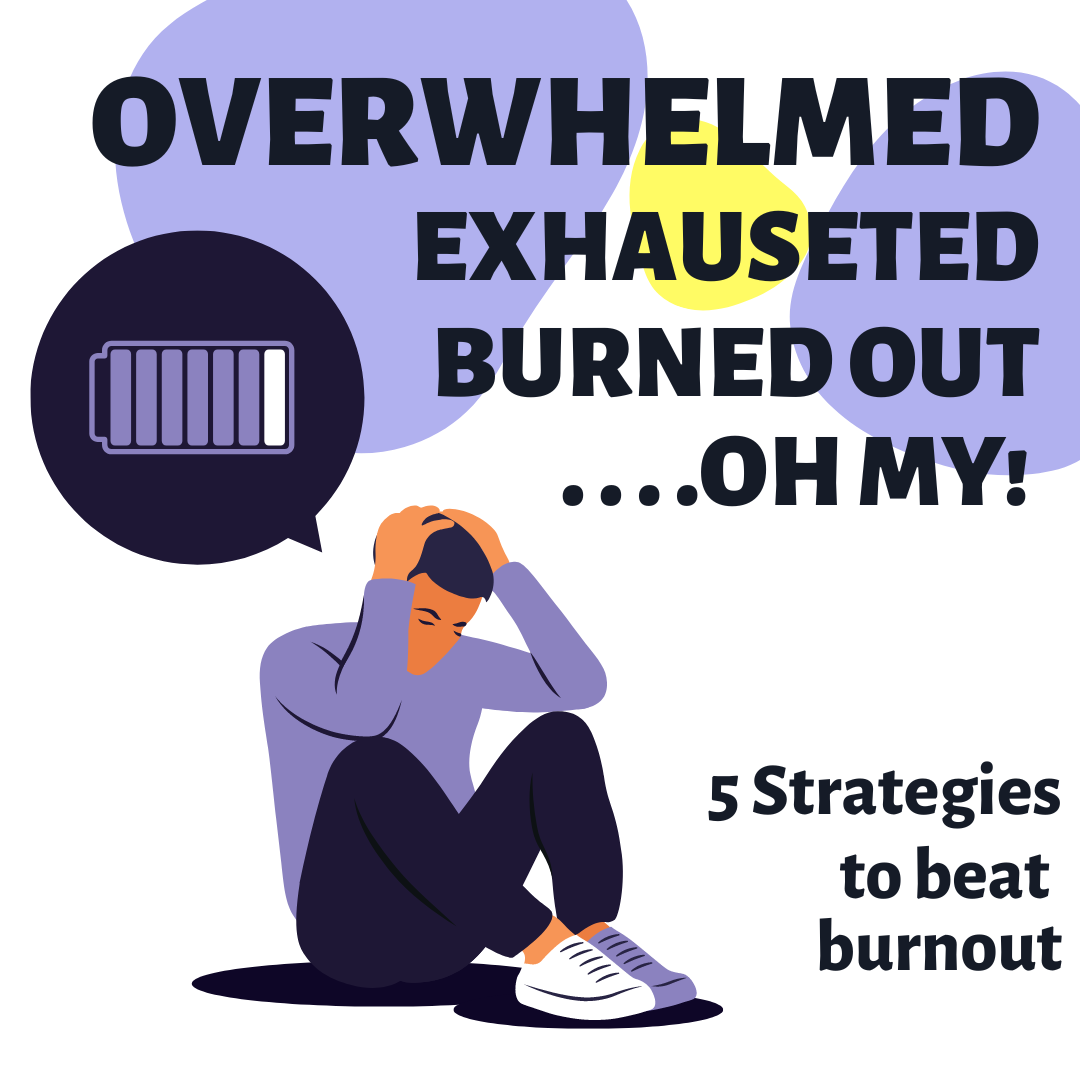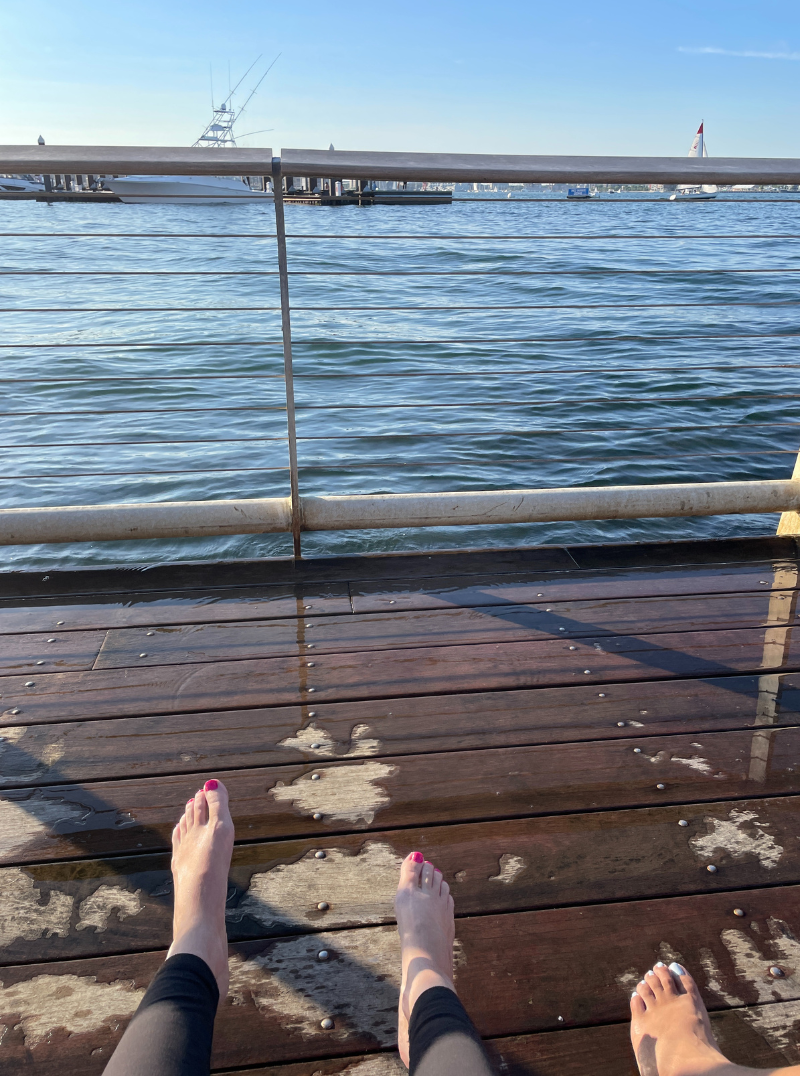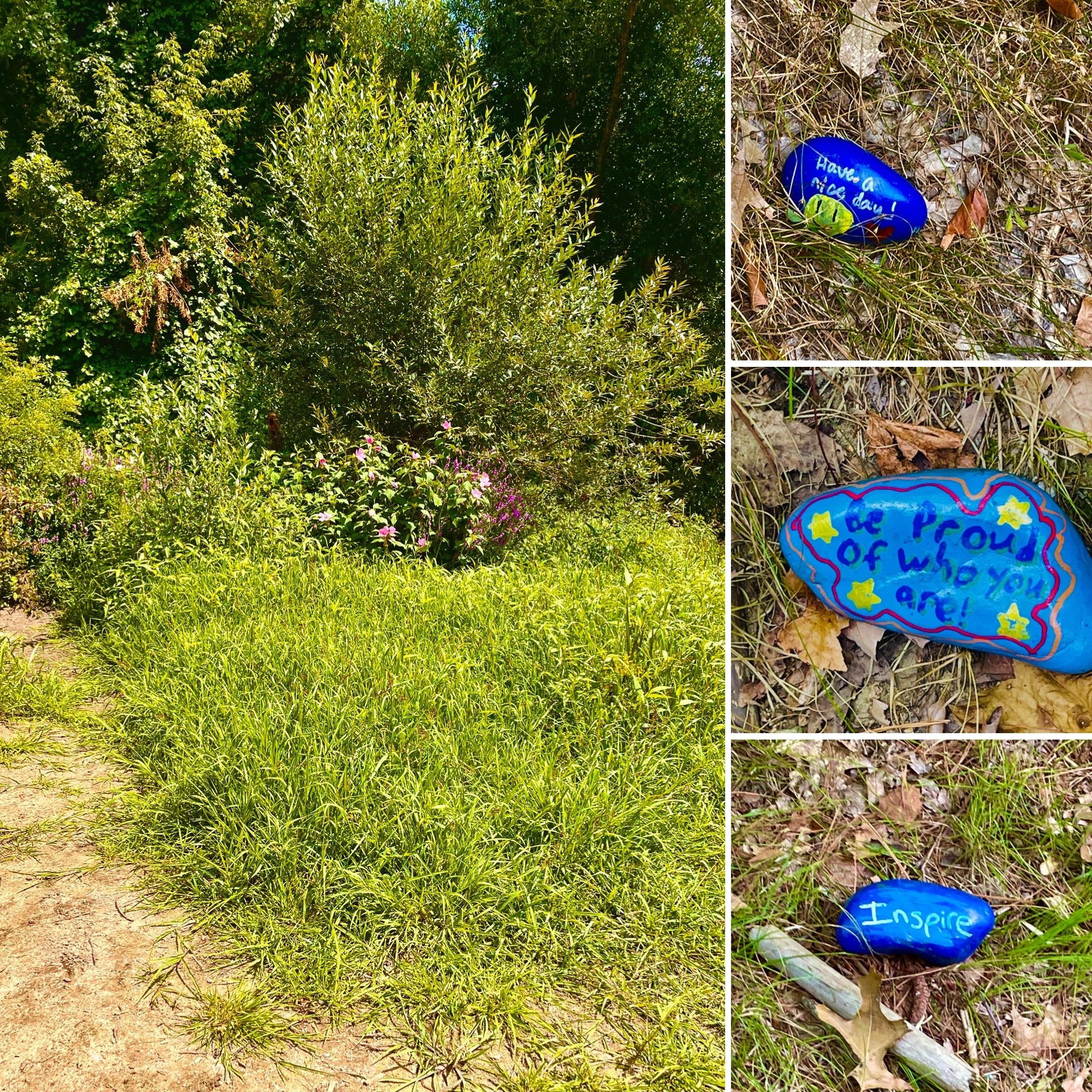Overwhelmed, Exhausted, Burned Out…Oh My! 5 Strategies to Beat Burnout
Posted on: 8/25/22
Posted by: Maggie
Intro:
Welcome back, and a very big hello to our first-time readers! I am a research staff person at the Transitions to Adulthood Center for Research and I write about my experience living and working with multiple medical and mental health conditions.
staff person at the Transitions to Adulthood Center for Research and I write about my experience living and working with multiple medical and mental health conditions.
Today, I will be sharing my experience with burnout, particularly related to the COVID-19 pandemic. It is important to note that according to the World Health Organization (2019), “Burn-out is an occupational phenomenon. It is defined in ICD-11 as follows: ‘Burn-out is a syndrome conceptualized as resulting from chronic workplace stress that has not been successfully managed.’” Burnout typically only applies to the occupational or work setting, but given how pervasive the pandemic has been in all our lives, I am going to use the term more broadly for the purpose of this blog entry.
My Experience:
As a person with multiple physical and mental health conditions, living through the COVID-19 pandemic has led to various stages of exhaustion, compassion fatigue, and now a more generalized burnout. We all have suffered in different ways and at varying intensities throughout the duration of the pandemic. I am grateful for my situation over the past couple of years: supportive loved ones and friends, technology to stay connected, and the ability to work remotely. Even though my situation is privileged, I still face challenges. COVID-19 has brought up a lot of emotions for me. Some days I feel like I am on an emotional roller coaster. Unfortunately (and not surprisingly!), it is not as exhilarating as an amusement park roller coaster.
Due to my health conditions, I have been more isolated throughout the course of the pandemic. I live alone, which further compounded the physical isolation. Despite that, the world actually became more accessible to me due to the increase in virtual options, which is more conducive for my health conditions. For once, I had the energy and time to not just work and attend appointments, but to also volunteer and spend time with loved ones and friends virtually.
As the world reopens, though, the accessible options dwindle. I am feeling more isolated again. My health is declining as the strain on our healthcare system continues. Shortages are common in the medical community, but not to the extent that we are facing today. I struggle getting necessary surgeries, needed medications, essential medical supplies, and even adequate nutrition. Due to my chronic illnesses, I cannot get the necessary nutrients by eating food and hydrating orally; therefore, I receive all of my calories and fluids via home parenteral nutrition (HPN), which is basically, intravenous (IV) nutrition. There have been a variety of HPN shortages, which is quite challenging and worrisome because HPN is currently my only option for nutrition. As time passes, it is becoming increasingly difficult to ignore the impact this is having on my physical and emotional state. My mind is tired from the mixed emotions and thoughts. My body is not at 100%. I have burnout.
Strategies:
Burnout can affect all areas of our life. For example, it can affect job performance. My experience may derive from the COVID-19 pandemic, but the lessons learned can be applied to a variety of situations. Keep reading for 5 strategies and suggestions on how to combat burnout so you can be productive and conquer your workday!
1. Self-care
 Self-care is number one for a reason—you cannot give 100% if you are not taking care of your physical and mental health. Self-care may seem like a daunting and time-stealing task, but it can be done. Have fun with it!
Self-care is number one for a reason—you cannot give 100% if you are not taking care of your physical and mental health. Self-care may seem like a daunting and time-stealing task, but it can be done. Have fun with it!
Suggestions:
- Prioritize basic needs whenever possible, such as sleep, hydration, and nutrition. I find this essential to not just survive, but to thrive. This is particularly helpful for me during times like these when my health has declined.
- Lower stress levels. First, eliminate unnecessary stress from your life. Next, find ways to manage unavoidable life stressors:
- Walking, yoga, dancing, and spending time outdoors are great stress relieving activities.
- Only have five minutes? Try meditation, humor, or deep breathing.
- Exercise is vital for our health, including our mental health. It can alleviate stress, increase concentration, improve mood, and lead to better sleep. Signing up for group classes or working out with a friend is great for accountability and staying motivated!
- Work-life balance is hard but essential for your well-being. Make time for hobbies, exercise, relationships, and relaxation. It will give you that extra “oomph” for getting through your other responsibilities, such as work, school, and recovery. If you have not read my previous blog on work-life balance, you can check it out here
2. Decrease Isolation
This will look different for everyone depending upon risk level and other factors. I live with complex medical conditions, so I am often more isolated than my peers. If you cannot see people in person, get creative! Check out my previous blog entry, “Cold? Snowy? Icy? Rainy? Social Distancing Activities to Maintain Your Mental Health.”
factors. I live with complex medical conditions, so I am often more isolated than my peers. If you cannot see people in person, get creative! Check out my previous blog entry, “Cold? Snowy? Icy? Rainy? Social Distancing Activities to Maintain Your Mental Health.”
Suggestions:
- While working from home, I find it helpful to simultaneously play YouTube “Study with Me” videos, which is simply a video of the vlogger studying. It is like being back at the office, but without the commute!
- Boost motivation and productivity by planning social time for either before or after work, even if it is only for an hour. A few examples include attending a book club, getting together for coffee, or joining a Meetup group (virtual or in-person).
3. Reduce Cognitive Overload
 Cognitive overload occurs when the brain is receiving too much information for it to process at once. I find that it can negatively affect my productivity, short-term memory, and mental health.
Cognitive overload occurs when the brain is receiving too much information for it to process at once. I find that it can negatively affect my productivity, short-term memory, and mental health.
Suggestions:
- Practice self-care (see the first strategy). The threshold for cognitive overload is lower when sick, tired, or stressed.
- Try to limit multitasking. Less stimuli to the brain = Being present and calmer.
- Write down your tasks and utilize a calendar. No need to waste precious brain juice attempting to remember multiple tasks and appointments. For the techies out there—I recommend automating tasks to save time (and brain power).
- Delegate tasks when possible and ask for help when needed. Remember, asking for help is a sign of strength!
- Take short breaks throughout the day to engage in mindless activities. This allows the brain to rest and recharge. Have 10 minutes? Try my current favorites to refuel your brain:
- Cuddle with a pet.
- Work on a Sticker by Number book.
- Make a cup of tea. Prefer coffee? Try this whipped coffee recipe from Tasty.
4. Finding Meaning and Purpose
Living with multiple medical and mental health conditions can make it challenging to complete tasks and responsibilities, even when not experiencing burnout. I have been able to find meaning in my day through my job. I feel a sense of purpose and determination because I am able to give back to the mental health community. What gives you meaning and purpose?
challenging to complete tasks and responsibilities, even when not experiencing burnout. I have been able to find meaning in my day through my job. I feel a sense of purpose and determination because I am able to give back to the mental health community. What gives you meaning and purpose?
Suggestions:
- Volunteer on a project that you are passionate about.
- Start a new initiative at work (e.g. recognizing coworkers’ birthdays, lunch walk, diversity and inclusion workgroup).
- Random acts of kindness: Saying hello or drawing a smiley face on a customer’s coffee cup may seem small, but I can assure you it is not--it can make someone’s day. I recall days when I wanted to throw in the towel and give up on recovery, but a simple smile and hello was all it took to give me that extra boost and support.
- Paint affirmations on rocks and spread them in your community. Check out the ones I found on my hike this weekend!
5. Gratitude
 When the world feels out of control and chaotic, gratitude can be a useful tool. Gratitude puts me in a better headspace. This prevents me from spending unnecessary time on negative emotions and irrational thoughts. As a result, I am gifting myself with extra time to complete my daily and work responsibilities. Curious on how to cultivate feelings of gratitude?
When the world feels out of control and chaotic, gratitude can be a useful tool. Gratitude puts me in a better headspace. This prevents me from spending unnecessary time on negative emotions and irrational thoughts. As a result, I am gifting myself with extra time to complete my daily and work responsibilities. Curious on how to cultivate feelings of gratitude?
Suggestions:
- Focus on the positives by reframing a difficult situation or emotion. For example, I feel sad and left out when I cannot see my loved ones during a COVID-19 surge. I reframe the situation by making a mental list of the many ways I am able to stay connected with them. This turns my sadness into gratitude.
- Start a gratitude journal. Writing down what you are grateful for reinforces it in the brain, similar to making flashcards when studying for a test.
- Express gratitude. One way to achieve this is by mailing a card. Receiving snail mail that is not a bill is the best! I really like “Letters for a Year of Gratitude” by Lea Redmond. It consists of tear-out letter prompts that can be later mailed.
Conclusion:
When I began this entry, I was experiencing burnout. It was an emotionally draining process writing this, but it helped me get back on track and feel recharged. It is important to note that even though I am no longer burned out, it can pop up again. That is normal and expected. Continue to utilize these and other strategies to minimize and ward off future episodes. Burnout is real. Burnout is tough. Burnout IS NOT FOREVER. I have grown from this experience, as will you!
Often the greatest feat in life is turning adversity into strength.
References:
World Health Organization. (2019, May 28). Burn-out an "Occupational phenomenon": International Classification of Diseases. World Health Organization. Retrieved April 28, 2022, from https://www.who.int/news/item/28-05-2019-burn-out-an-occupational-phenomenon-international-classification-of-diseases
